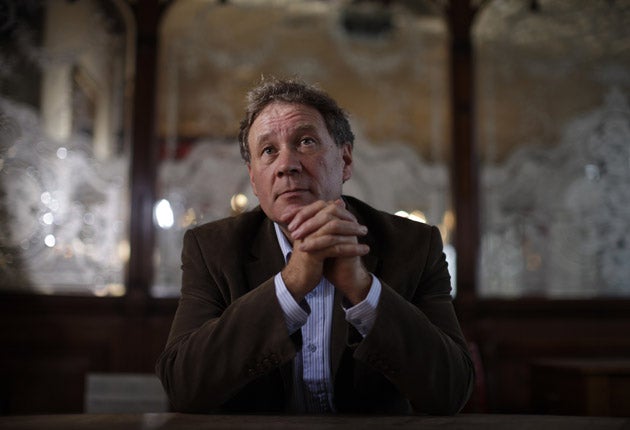The PM's official photographer 'needs trust not a state salary'
Jake Sutton, who snapped Thatcher, Kinnock and Blair, talks with Matthew Bell

Your support helps us to tell the story
From reproductive rights to climate change to Big Tech, The Independent is on the ground when the story is developing. Whether it's investigating the financials of Elon Musk's pro-Trump PAC or producing our latest documentary, 'The A Word', which shines a light on the American women fighting for reproductive rights, we know how important it is to parse out the facts from the messaging.
At such a critical moment in US history, we need reporters on the ground. Your donation allows us to keep sending journalists to speak to both sides of the story.
The Independent is trusted by Americans across the entire political spectrum. And unlike many other quality news outlets, we choose not to lock Americans out of our reporting and analysis with paywalls. We believe quality journalism should be available to everyone, paid for by those who can afford it.
Your support makes all the difference.They are there, two paces behind, in the corridors of Downing Street; they sit in on top-level meetings; they emerge, white-knuckled, from helicopters in Baghdad or Kabul.
They are not reporters, but they can, with the right picture, tell a story more powerful than any thousand-word dispatch. The job of official photographer to the prime minister comes with unique and privileged access, one that other journalists can only dream of.
But the delicate dynamic between prime minister and his photographer – total access in exchange for a fair portrayal – has changed since last week. By awarding Andrew Parsons a civil service salary of £35,000, David Cameron has, according to some, jeopardised the impartiality of a historically important role. This is certainly the view of Jake Sutton, who was Tony Blair's official photographer during the last six months of his premiership.
According to Sutton, 55, who also photographed the campaign trails of Neil Kinnock and Margaret Thatcher, an official photographer should never be paid by his subject, and certainly not by the state. "I couldn't do it," he says, "I wouldn't want any money from the state. You have got to keep your independence. The most important thing is not to become one of them."
Striking a balance between developing insider contacts and remaining impartial is a challenge innate to journalism. But few journalists receive their wage from the subject of their stories. If the purpose of a photographer following the prime minister is to create a record for the history books, impartiality is even more important.
Amid raucous scenes in the House of Commons on Wednesday, the Labour leader, Ed Miliband, accused Cameron of making "vanity appointments," and questioned whether it was "a wise judgement, when he is telling everybody to tighten their belts". It doesn't help Cameron's case that Parsons is a Conservative.
But according to Sutton, political ties are not the issue. He was staunchly left-wing when Derry Irvine, a friend of his father – the artist Philip Sutton – asked him if he could take a few snaps of a young Tony Blair, when he first stood for parliament in 1983.
"I was very political at that time," he says, "I was passionate about South Africa and apartheid, and was often on demonstrations. But Derry and Tony didn't know that. I was just a photographer to them."
Sutton was not paid for those early shots; he did them as a favour, which would later reap dividends. Back then, he was working as an agency photographer; he built up a career on assignments of his own choosing, including two-and-a-half years living in Kabul. When, in 2006, he had the idea of recording the last months of Blair's premiership, he wrote to No 10 asking for access and after a couple of interviews, was appointed official photographer. Crucially, though, he would not be paid. "The reason they chose me was entirely to do with trust," he says, "we had forged a bond all those years ago and they knew I was trustworthy. What you are aiming for is to become a ghost they can forget about. That's when you get the best pictures."
The temptation to sell a choice photograph must always be there though? "No. The whole point of the job is to persuade the prime minister he can trust you. Only then can he forget you're there. " Sutton illustrates his argument with an example from his days shadowing Margaret Thatcher during the election campaign of 1983.
"We were on a visit to the offices of the Bristol Daily Press. I left the pack and went downstairs and there, lying spreadeagle on the floor, was one of her ministers. It looked he was paralytically drunk, though in fact he'd just done his back in. It would have been a fantastic photo. But I made the decision to leave it. Maintaining the prime minister's trust was more important."
Sutton was fortunate to have been able support himself while shadowing prime ministers – with financial independence comes creative freedom and he never had his work vetted. He is unequivocal that to accept a salary is to undermine the authority of the end product. But he does not agree that Parsons' politics will necessarily colour his work. "The only thing that matters is trust. If you don't get that you can't do it. Clearly Cameron trusts Parsons – there must be plenty of Tories he doesn't."
Join our commenting forum
Join thought-provoking conversations, follow other Independent readers and see their replies
Comments